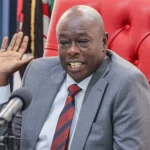Kisumu Senator Tom Ojienda says the abduction of prominent Ugandan opposition politician Kizza Besigye in Kenya before he was on Wednesday produced in a Ugandan court raises concern over the security of Kenyan borders.
Besigye, a long-time opponent of President Yoweri Museveni, was in Kenya for Narc Kenya party leader Martha Karua’s Sunday book launch but was captured at his apartment in Nairobi’s Riverside neighbourhood on Saturday, per court documents.
He was sent back home where he was held in a military jail and later charged with plotting to undermine national security, illegal possession of firearms and negotiating to buy arms abroad.
Ojienda on Thursday described Besigye’s case as worrying, supported claims by government officials that there was no knowledge of the Ugandan opposition figure’s presence in Kenya.
“Besigye came to Kenya undercover; he came to Kenya as a private citizen and instead of going to a hotel, he went into an apartment from where he was abducted,” the senator told Citizen TV’s Day Break program on Thursday.
“There was no information on the government’s part about at what point he entered the country. He was supposed to attend a book fair organised by Martha Karua but was not in attendance.”
Ojienda, who sits in the Senate Committee on National Security, Defence and Foreign Relations, added that “the worrying trend is access; whether Kenya’s border points are porous and you can’t notice certain personalities come in.”
“He was taken out of Kenya illegally, but he is facing a legal process in Uganda stemming from things he did before coming here… as a region, we need to know how we should treat individuals who have committed crimes in their country and run to another country to hide”
While Kenyan authorities have denied any involvement in his abduction and deportation, the case has sparked uproar over a seemingly growing trend of foreign nationals, some even asylum seekers, being captured and handed over to their countries’ authorities.
Ojienda said Kenyan security officials should not be entirely blamed for Besigye’s abduction, arguing that there is a possibility the Ugandan security agents who reportedly abducted him might just have entered Kenya because the East African Community (EAC) Common Market regulations ensure that citizens of the EAC can move freely within the region.
“With the East African passport, movement within these countries is open without discrimination. That makes it hard to stop a Kenyan, Ugandan or Tanzanian from moving to the next country,” said Ojienda.
“That explains the possibility that these Ugandan mercenaries who came in to abduct Besigye just came into their country, took him and drove away. It is an East Africa issue, not entirely about Kenya. You cannot blame the apparatus here for how movement across East Africa takes place.”
Besigye denied the charges levelled against him on Wednesday and was ordered to remain in custody until December 2.



